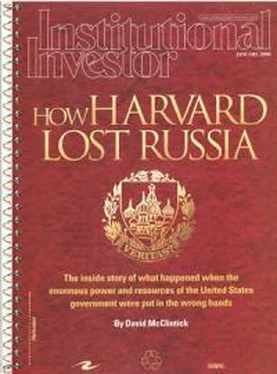The Harvard crowd was soon to become embroiled in a bigger mess.
IN THE SUMMER OF 1995, YELTSIN DECREED THAT the RSEC would start licensing and registering mutual funds to attract the estimated $40 billion in "mattress money" that skeptical Russians had stashed away. Alarmed by Communist parliamentary gains spurred by persistent financial fraud, Yeltsin made safe investments a major campaign theme as he looked toward the 1996 presidential election. He ordered Sokin and Vasiliev to make mutual funds the highest priority of the RSEC.
In anticipation of the decree, several global securities and investment banking firms -- Credit Suisse First Boston, Robert Fleming & Co., Franklin Templeton Investments and Pioneer Group among them -- had deployed people and resources to Moscow. As the RSEC's chief Harvard adviser, Hay strove to build relationships with the potential mutual fund operators. Fleming's Moscow representative, Elizabeth Hebert, 33, was a tall Ohio native with flowing dark hair. She held master's degrees from Columbia University in business and international affairs. Fluent in Russian, she aspired to start her own company to launch funds specializing in Russian securities. Hay encouraged Hebert and promised to help her. Soon they were close friends.
On November 15, 1995, Shleifer and Zimmerman gave a dinner party at their home in Newton honoring one of Yeltsin's top economic advisers, Alexander Livshits, a prominent Moscow academic. Hay and Hebert flew in for the event, which was attended by a number of Shleifer's Harvard colleagues. Feldstein and his wife, Kate, were there, as was Boston philanthropist Peter Aldrich, then 51, the founder and a principal of one of the oldest and largest real estate investment advisory firms in the U.S., AEW Capital Management. A graduate of Harvard College and Harvard Business School, Aldrich had been active in university affairs for decades, donating a lot of money and counting the Feldsteins, Shleifer and Zimmerman and other professors and their families as friends. Aldrich's interest in business had strong intellectual dimensions. He regularly assembled Harvard professors to discuss economic and political ideas with the chief investment officers of endowment and pension funds. He was especially interested in Russia. Beginning in the early 1990s, Aldrich and his company had made several modest investments in Russia and neighboring countries, converting an apartment house in St. Petersburg into a modern office building, for example, and turning a Moscow warehouse into a Gold's Gym.
By the end of the evening, Shleifer, Zimmerman and Hay had prevailed upon Aldrich to meet the following day with Hebert to learn about her plans for a mutual fund company.
Aldrich received Hebert as a favor to his friends. Despite his interest in Russia, he wasn't impressed and barely remembered the meeting later. "How many times do you remember you swatted the fly?" he said when pressed during his sworn deposition in the U.S. government lawsuit. Ever the polite, patrician Brahmin, however, Aldrich did not rebuff Hebert, and she returned to Moscow optimistic that he might invest in her venture.
To launch her company, Hebert knew she would need back-office expertise. She turned to Julia Zagachin, the Russian-born, U.S.-educated clearing and settlement specialist who had helped Hay make sure the 1994 oil stock deal was properly registered. High-strung and intense, Zagachin had been forced out of her job heading the Depository Clearing Co., having been told, like Bernard, that a Russian was needed. Zagachin had retorted that the real reason was that she was "young, female, American and Jewish." Over Thanksgiving drinks at the Slavyanskaya Hotel, she and Hebert agreed to work together. Zagachin declined to be interviewed for this article.
Hay, meantime, continued to facilitate the relationship between Hebert and the reformers in Yeltsin's circle. That Christmas the Idaho native hosted a weeklong party in his home state to which he invited Hebert; Vasiliev and his wife, Tatiyana; and Sokin and one of his girlfriends. AID funds paid for the festivities, which included snowmobiling and hikes in the woods. Hebert used the time to talk up her mutual fund plans with Sokin and Vasiliev.
A few days later Hay and Hebert flew east to spend New Year's Eve at Shleifer and Zimmerman's home in Newton. Hebert continued to discuss her plans, expanding on her ideas while strolling around Harvard Square with Shleifer on January 1. She then flew to New York and pitched her fund to an array of potential financial backers.
By the early months of 1996, Hay and Hebert's budding romance was a hot gossip item among both the expat community of Moscow and their Russian colleagues, many of whom marveled at the attraction of opposites. Hebert was the kind of person who would arrive at a meeting promptly, wearing a trim suit, carrying a leather portfolio of meticulous notes. Hay would blow in late, hair flying, clothes askew, without a pen.
Hay and Hebert's relationship blurred the line between personal and professional. He let her use his AID-financed car and driver and sank $20,000 into the Fleming Russia Securities Fund, which she managed. As she became friendly with Vasiliev and Sokin, Hebert let the Moscow business community know that she had a close relationship with the people who would be registering and regulating her Russian mutual fund.
IN JANUARY 1996, SHLEIFER AND ZIMMERMAN began to expand their questionable activities. According to the U.S. government's complaint, Zimmerman set up a Russian company, Novyi Mir, or New World Capital. Zimmerman turned to Central Illinois Bank, to arrange a $5 million loan to Novyi Mir. The loan was secured by a certificate of deposit purchased from the bank, the U.S. government said. Zimmerman invested the money in Russian government debt instruments, or GKOs. The U.S. government alleged that profits from the GKO investments were sent to the bank as loan repayments, thus avoiding Russian taxes that would have been due had the funds been declared as profits. The money was then forwarded to Zimmerman's company in Cambridge.
In February, Zimmerman flew to Moscow to confer with Hebert about investing in her mutual fund company -- an investment that was barred by the U.S. government's and Harvard's conflict-of-interest rules, which applied to employees' family members. Hebert and her new partner, Zagachin, gave a full presentation to Hay, Sokin and Zimmerman. Hebert asserted that she had the backing of prominent Russians, including former Finance minister and senior Parliament member Boris Fyodorov and cellist Mstislav Rostropovich. She said she needed to raise upwards of $1 million. Zimmerman tentatively agreed to invest $200,000 and to take the lead in helping her raise the rest of the money.
The Yeltsin decree establishing the rules for a mutual fund industry required that each such company provide for strict back-office controls, such as registration of shares and shareholders, custody of securities, financial recordkeeping and regulatory compliance. It wasn't enough for the fund management company to establish such controls internally. The decree required the company to contract them out. In late February 1996, Hebert contacted Forum Financial Group, a Portland, Mainebased company that specialized in such functions and was already working with mutual fund companies in Poland. Forum's CEO, John Keffer, flew to Moscow, met with Hay, Vasiliev, Hebert and Zagachin and devised a plan for his company to become Hebert's strategic partner. That would be about the only thing that Keffer and the others would later agree on.
FROM THE BEGINNING THE HARVARD RUSSIA Project had failed to make complete, timely reports to AID. By March 1996 these lapses had come to the attention of the House International Relations Committee, which directed the U.S. General Accounting Office to audit the program.
Читать дальше






![Джонатан Димблби - Barbarossa - How Hitler Lost the War [calibre]](/books/385421/dzhonatan-dimblbi-barbarossa-how-hitler-lost-the-w-thumb.webp)





